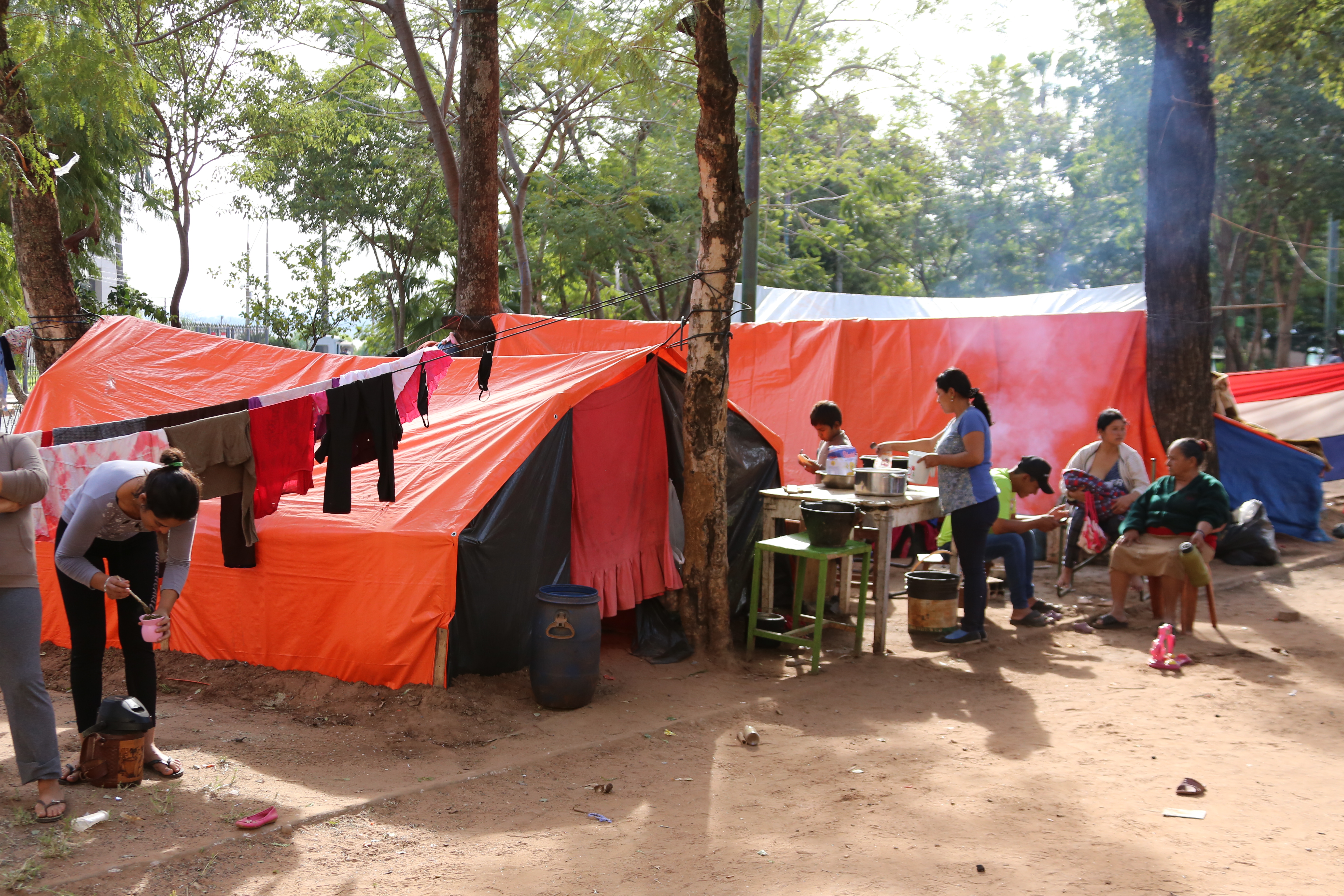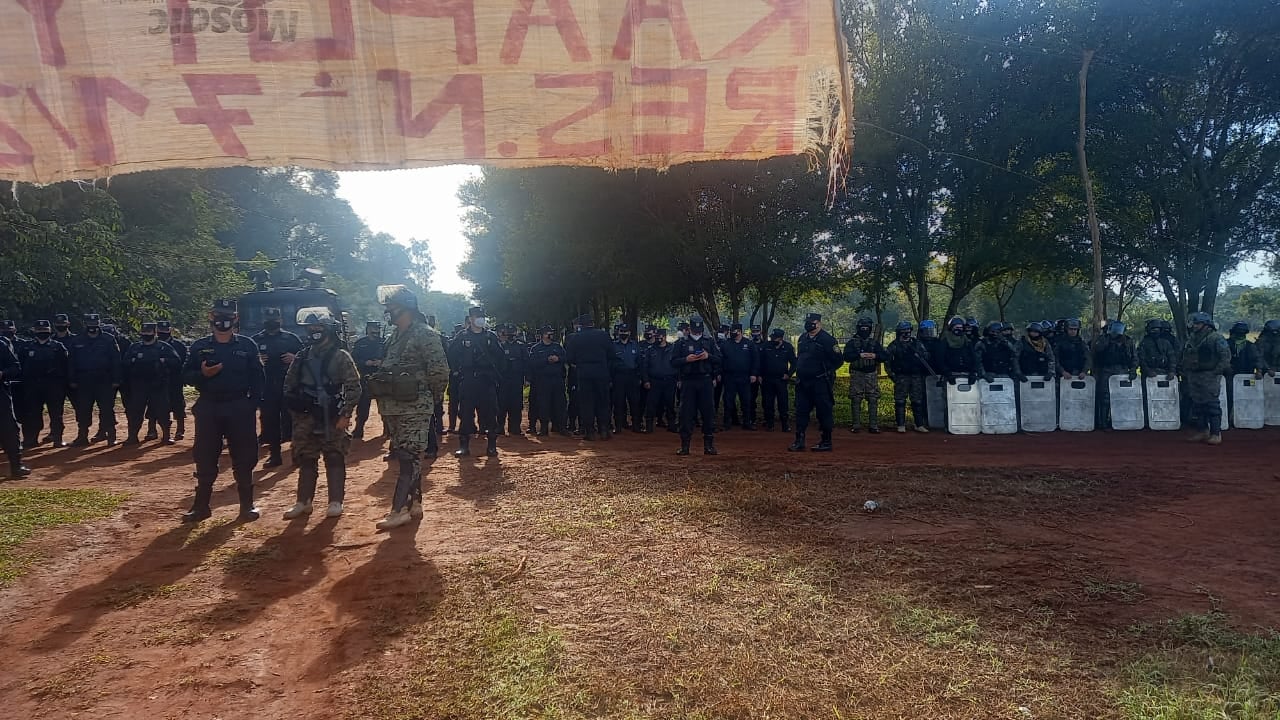Latin America
Related: About this forumParaguay Indigenous community evicted in land dispute
Indigenous community Ka’a Poty 1 wants land back and compensation after armed police and guards allegedly burned homes.

The families of Ka'a Poty 1 have been living in improvised tents in a central square in Asunción since June 16. Nighttime temperatures have at times approached 0 degrees Celsius (32 Fahrenheit) [William Costa/Al Jazeera]
By William Costa
30 Jul 2021
Asuncion, Paraguay – Marta Díaz sits among a settlement of improvised tents made from plastic sheeting in a central square of Paraguay’s capital Asunción, just meters from the National Congress building. A brightly-coloured painted scene hangs nearby depicting rural, wooden houses set on fire as a group of unbelieving people look on, reflecting what happed to her community.
“We aren’t happy here. We came because of the pressure from bad people that threw us off our land, that burned it. We aren’t free,” she told Al Jazeera.
Díaz is the leader of Ka’a Poty 1, a community of the Ava Guaraní people – one of 19 Indigenous nations in Paraguay – who were forcibly evicted from their land in the Itakyry district in the east of the country on June 15 by a combination of armed riot police and private guards.
Since June 16, the 60 adults and 44 children have been camping in the harsh winter conditions of the city square, demanding justice and restitution of their land.
Ka’a Poty 1 are one of at least seven Indigenous communities to suffer violent evictions by state forces and armed civilians due to land ownership disputes in the past three months – prompting a large public outcry and condemnation from human rights organizations such as Survival International.

State forces and private guards arrive to evict the Ka’a Poty 1 Indigenous group from land in Itakyry district in eastern Paraguay on June 15, 2021 [Courtesy of Ka’a Poty 1 Indigenous community]
Díaz said that the eviction saw all the community’s houses, their temple, and school burned to the ground. Practically all their possessions were stolen, their crops were destroyed, and their pets were killed before their eyes. A pregnant woman miscarried, and a 15-day-old baby was hospitalized.
“We lost everything. They didn’t even let us take the clothes from our homes”, she said.
Indigenous people form one of the most marginalized and vulnerable sectors in Paraguay, with more than 30 percent facing extreme poverty, according to 2017 official figures – far above the national average.
More:
https://www.aljazeera.com/news/2021/7/30/paraguay-indigenous-community-evicted-in-land-dispute
Judi Lynn
(164,122 posts)theHandpuppet (19,964 posts) Tue Aug 19, 2014, 08:56 PM
Genocide of the Ache People of Paraguay Will Be Tried in Argentina
Rick Kearns
8/18/14
The Ache people of Paraguay have filed a criminal complaint of genocide and crimes against humanity committed against their people by various citizens, military and officials in the Paraguayan government for their role in the displacement, murder, enslavement and rape of the Ache from the 1950s through the 70s.
Based on evidence provided by survivors as well as anthropologists, human rights advocate, attorneys, journalists, priests and others, the story of what happened to the Ache people of Paraguay was presented to the Fifth Federal Court in Argentina in April after Paraguayan officials refused to prosecute the case.
According to Aitor Martínez, a Spanish attorney who is on the legal team that had filed the charges on behalf of the National Ache Foundation, they are awaiting trial dates from Argentine Judge Norberto Oyarbide. Judge Oyarbide agreed to hear the case based on the legal principle of 'universal jurisdiction' that allows for prosecution of charges of genocide and crimes against humanity in a foreign court if the judicial system of the home country did not prosecute the case.
In a recent interview, Martínez said that then Paraguayan President Alfredo Stroessner was informed of the atrocities by Paraguayan activists, officials from the United Nations and others but President Stroessner did not take any steps to stop the violence; some testimony also alleges that Stroessner, a United States ally at the time, spent time with pre-adolescent indigenous girls who had been forced into prostitution....
Read more at http://indiancountrytodaymedianetwork.com/2014/08/18/genocide-ache-people-paraguay-will-be-tried-argentina-156444
https://www.democraticunderground.com/12291612
Judi Lynn
(164,122 posts)This article is more than 1 year old
The pro-Stroessner celebrations have all but disappeared but Paraguay is yet to fully confront the legacy of military rule
William Costa in Asunción
Tue 10 Dec 2019 05.00 EST
For decades, it was known as the fecha feliz – the happy date – a cheerful-sounding name for the annual commemoration of South America’s longest-ruling military dictator.
Paraguay’s General Alfredo Stroessner used the nationwide birthday party as an element of his carefully cultivated cult of personality. And the celebration has shown enormous staying power, surviving both the coup that toppled Stroessner in 1989 and his death in exile in Brazil in 2006. But this 3 November, the General Stroessner polka – the celebration’s traditional adulatory soundtrack – was barely heard in the capital city. Instead, Asunción rang with music from anti-Stroessner parties.
. . .
And as recent events in South America have shown, authoritarian pasts can weigh heavily on countries decades after democratic transition, despite outward signs of change. Chile is now well into its second month of turmoil, fueled in part by anger over the neoliberal policies introduced by Augusto Pinochet.
Fernando Robles, a Paraguayan lawyer, argues that his country has still not shaken off the dead hand of dictatorship.
He spent three years in prison for belonging to a clandestine anti-Stroessner movement – “We were all tortured. Horrifically tortured, as was the custom of Stroessner and his police force” – but Robles worries that many in his country do not understand the lessons of the past. “Today, a 15-year-old or an 18-year-old doesn’t even know that Stroessner existed. The education system doesn’t mention the dictatorship. There is no intention of teaching the past so that it doesn’t repeat itself.”
Paraguay’s relationship with its troubled past was thrust into the spotlight in September, by the discovery of human remains at a house once owned by Stroessner. The remains are still under analysis to determine if they are from victims of the dictatorship, said Dr Rogelio Goiburú, head of the justice ministry’s department for historical memory and reparation.
Goiburú has every reason to want to uncover the truth about the dictatorship’s crimes: his own father was murdered by Stroessner’s regime. “All imaginable crimes were committed under Stroessner,” he said.
Political opponents were forcibly disappeared, young girls were sexually enslaved by high-ranking officials, members of the LGBT community were targeted and indigenous peoples faced violence that has been labelled as genocide.
A 2008 report from the Paraguayan Truth and Justice Commission found that at least 423 people were murdered, 18,722 tortured and 3,470 forced into exile during the dictatorship.
More:
https://www.theguardian.com/world/2019/dec/10/paraguay-dictator-alfredo-stroessner-dictatorship